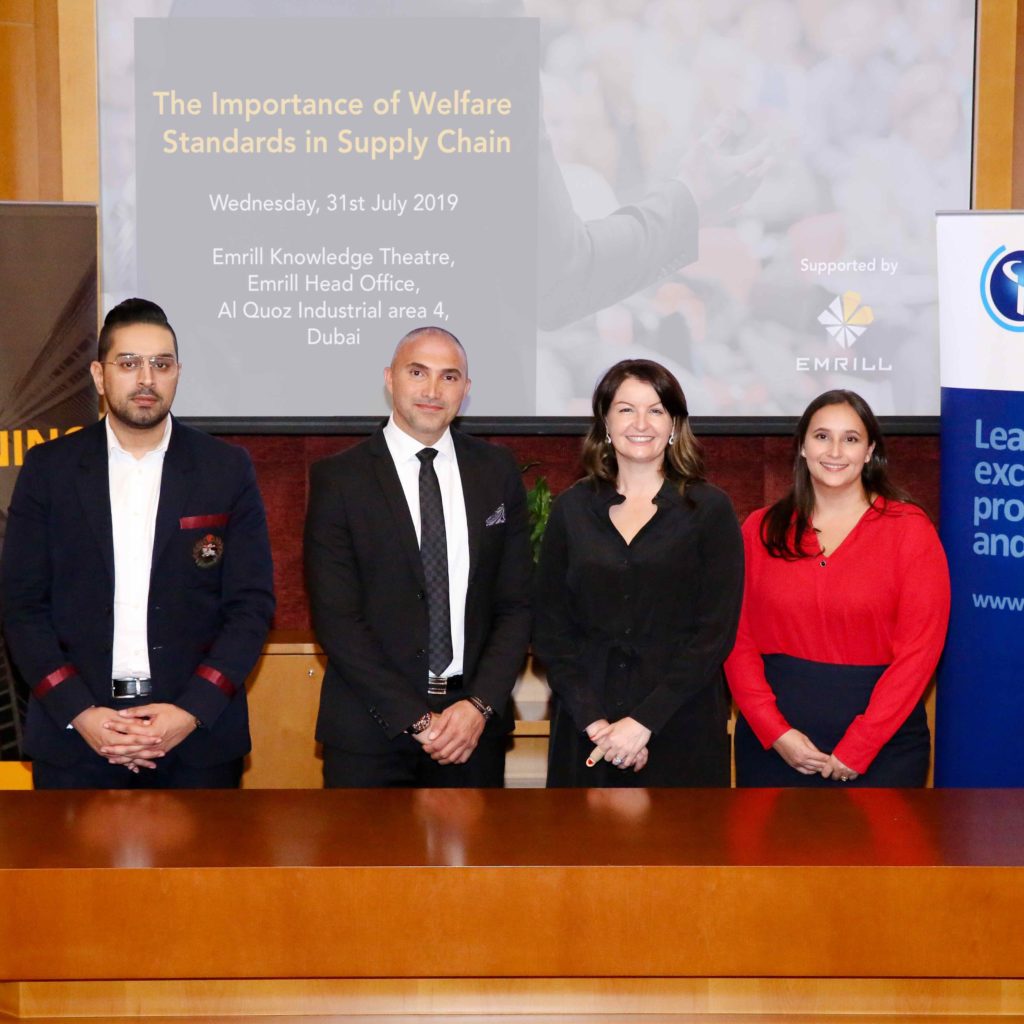Emrill Services joins forces with the CIPS MENA to improve welfare standards in MENA
Emrill Services has joined forces with the Chartered Institute of Procurement & Supply MENA (CIPS MENA) to emphasise the importance of improving welfare standards in the MENA region’s supply chains. In an event held at Emrill’s Knowledge Theatre in Dubai, procurement professionals from a diverse range of sectors gathered to discuss the impact of welfare standards and the need to adopt global best practices.
Prior to the event, Sam Achampong, CIPS MENA’s regional head and general manager, explained the importance of the topic: “Worker welfare should be high on the agenda for businesses regardless of the size of projects being implemented.
“I’m delighted our partners at Emrill see this as a focus of their work and that we have representation from Expo 2020 Dubai, who are taking the lead in keeping their workers safe. Not only is reputation at risk if companies do not look at safety and welfare for their own infrastructure projects, but of course, this is about saving lives and improving health throughout supply chains.”
In its January 2019 report, Fitch Solutions estimated the MENA construction industry will grow by 7.5 per cent this year and will continue to expand at an average annual rate of 6.8 per cent until 2022. The report predicts the growth will be driven by the Arabian Gulf states diversifying away from oil and gas, instead focusing on building large-scale developments, such as Expo 2020 Dubai and the Riyadh Metro in Saudi Arabia. In addition, the report surmised the increase in large infrastructure projects in the region has resulted in many companies more seriously considering current conditions and encouraging improved worker welfare rights.
Ahsan Sarwar, CIPS MENA’s country manager for Saudi Arabia, opened the event with a brief introduction to the organisation. He introduced CIPS’ presence globally and how the organisation is working with members to raise procurement standards.
Emrill’s Commercial Director, Suzie Razmjou, delivered a thought-provoking presentation on improving welfare standards in the supply chain, where she claimed companies in the region need to play their part in ensuring migrant workers are treated with dignity and respect. She stressed, procurement professionals can only affect real change when they work together and use their influence to encourage and support contractors and subcontractors to improve conditions. She went on to say that only when executive support is given to worker welfare initiatives and consequences are applied to non-compliant providers will welfare targets be met. Emrill has cancelled contracts with 40 suppliers, which were unable or unwilling to improve standards, since beginning the programme.
Razmjou also referred to the Dhaka Principles, which provide a roadmap tracing the journey of a migrant worker from recruitment, employment, to the end of a contract. The discussion focused on how companies in the region can ensure their employees and those employees within their supply chains are provided with living and working conditions that are both safe and decent.
Razmjou outlined the actions Emrill has taken to influence its subcontractor portfolio of over 500 suppliers in line with the Dhaka Principles, which were introduced in 2012 by the Institute for Human Rights and Business to improve health, safety and employee welfare. She said: “We have undertaken an ambitious ongoing project in which we have carried out welfare visits on our service providers’ labour accommodation to ensure living standards meet Emrill’s standards. In cases where suppliers are underperforming, we actively work with them to improve the welfare of their employees.
“We have used our influence in the market as a way of making a difference and improving the lives of thousands of workers. At Emrill, we feel we have a collective responsibility to ensure those individuals delivering services to our clients are looked after properly.”
As part of the initiative, inspectors from Emrill’s supply chain and senior management teams visit sites, inspecting hundreds of accommodations since the progamme’s launch. As a result, some companies have moved location and Emrill has provided recommendations to approximately one third of the suppliers visited.
Razmjou added: “We have achieved real success with this initiative, and we want to pass on our learnings to other companies in the region. Emrill is delighted to be partnering with CIPS MENA, as events such as this are so important for raising awareness and creating a real shift in collective thinking.”
Dr Arafat El Mourad, VP and Head of Strategic Sourcing: Group Procurement and Realty Services Emirates NBD, closed the event with a presentation on innovation in procurement. He explained innovation is much more than technology. He explained: “Rather, it is the way procurement professionals manage relationships with internal and external stakeholders with a focus on implementing collaborative changes to digitise, resource capabilities, speaking the language of your stakeholders, and improve business processes.”
A recurring theme of the event was procurement professionals and companies within the region have a collective responsibility to do what is morally and ethically right to ensure worker welfare standards in the region are raised. By committing to not working with contractors who fall short and will not make improvements, a clear message is sent that sub-par conditions will not be tolerated and will result in consequences.






















 Kuwaiti developer URC signs with Ahmadiah Contracting for the Commercial District development at Hessah AlMubarak
Kuwaiti developer URC signs with Ahmadiah Contracting for the Commercial District development at Hessah AlMubarak